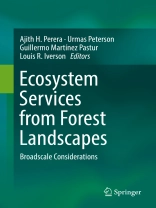Over the last two decades, the topic of forest ecosystem services has attracted the attention of researchers, land managers, and policy makers around the globe. The services rendered by forest ecosystems range from intrinsic to anthropocentric benefits that are typically grouped as provisioning, regulating, supporting, and cultural. The research efforts, assessments, and attempts to manage forest ecosystems for their sustained services are now widely published in scientific literature. This volume focuses on broad-scale aspects of forest ecosystem services, beyond individual stands to large landscapes. In doing so, it illustrates the conceptual and practical opportunities as well as challenges involved with planning for forest ecosystem services across landscapes, regions, and nations. The goal here is to broaden the scope of land use planning through the adoption of a landscape-scale approach. Even though this approach is complex and involves multiple ecological, social, cultural, economic, and political dimensions, the landscape perspective appears to offer the best opportunity for a sustained provision of forest ecosystem services.
İçerik tablosu
Preface.- Ecosystem services from forest landscapes: An overview.- Effects of climate change on CH4 and N2O fluxes from temperate and boreal forest soils.- What are plant-released biogenic volatiles and how they participate in landscape- to global-level processes?.- Towards functional green infrastructure in the Baltic Sea Region: knowledge production and learning across borders.- Sustainable Planning for peri-urban landscapes.- Barriers and bridges for landscape stewardship and knowledge production to sustain functional green infrastructures.- Solving conflicts among conservation, economic and social objectives in boreal production forest landscapes; Fennoscandian perspectives.- Natural disturbances and forest management: interacting patterns on the landscape.- Ecosystem services from forest landscapes: Where we are and where we go.- Index
Yazar hakkında
Ajith H. Perera, Ph.D. (Penn State University), is a Senior Research Scientist and leader of the forest landscape ecology program at Ontario Forest Research Institute, Ontario Ministry of Natural Resources and Adjunct Professor at University of Waterloo, York University, and University of Guelph. Dr. Perera has over 25 years of research experience in landscape ecology, focusing on quantifying and modeling spatio-temporal patterns in boreal forest disturbances. He has authored over 150 science publications and has been senior editor, co-editor and author of nine books on Forest Landscape Ecology.
Urmas Peterson, Ph. D. Geogr., is a Senior Research Fellow at the Department of Remote Sensing, Tartu Observatory, Estonia and an Associate Professor with the Institute of Forestry and Rural Engineering, Estonian University of Life Sciences. Dr. Peterson has over 30 year-experience in remote sensing of seasonal and successional dynamics of northern temperate forest communities. His current research interests include understanding and measuring boreal and northern temperate forest landscape changes using remote sensing tools.
Guillermo J. Martínez Pastur, Forest Engineer (Universidad Nacional de La Plata) and Doctor in Agronomy (Universidad Nacional del Sur), is a Senior Research Scientist at CONICET, Argentina. Dr. Martinez Pastur has over 20 years research experience in forest management, conservation and landscape ecology, focusing on the southernmost native temperate forests of the World. He has authored more than 150 papers and 25 book contributions and has been associate editor of several journals and special issues related to ecology and landscape ecology.
Louis R. Iverson, Ph.D. (University of North Dakota) is a research landscape ecologist with the US Forest Service, Northern Research Station in Delaware, Ohio, and Adjunct Professor with the School of Natural Resources at the Ohio State University. He has served as President of the US-International Association for Landscape Ecology and VP for the umbrella IALE and is currently Deputy Chair for the International Association for Forest Research Organizations (Landscape Ecology working party) and a Certified Senior Ecologist with the Ecological Society of America. He has been conducting landscape ecology research since 1982, with over 200 publications in the field. His current research interests include understanding the potential tree species impacts from drought and climate change, and using prescribed fire and thinning in restoring oak communities.












